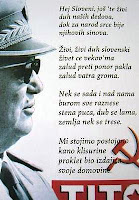Tiananmen Square on Stamp
 Tiananmen Square is the largest city square in the world measuring 440,000 m² - 880m by 500m. It is located in the center of China's capital, Beijing, and named after the Tiananmen Gate, also called the Gate of Purification. This gate separates the Forbidden City from the Tiananmen Square. It has great cultural significance as it was the site of several important events in Chinese history. Outside China, the square is best known in recent memory as the focal point of the Tiananmen Square protests of 1989, a pro-democracy movement which ended on 4 June 1989 with the declaration of martial law in Beijing by the government and the death of hundreds, perhaps more, of protesters. When I visited Beijing, the Chinese nationals were not aware of the said massacre because media was banned from covering the event.
Tiananmen Square is the largest city square in the world measuring 440,000 m² - 880m by 500m. It is located in the center of China's capital, Beijing, and named after the Tiananmen Gate, also called the Gate of Purification. This gate separates the Forbidden City from the Tiananmen Square. It has great cultural significance as it was the site of several important events in Chinese history. Outside China, the square is best known in recent memory as the focal point of the Tiananmen Square protests of 1989, a pro-democracy movement which ended on 4 June 1989 with the declaration of martial law in Beijing by the government and the death of hundreds, perhaps more, of protesters. When I visited Beijing, the Chinese nationals were not aware of the said massacre because media was banned from covering the event.
Used as a massive meeting place since its creation, its flatness is contrasted by the 38-meter (125 ft) high Monument to the People's Heroes, and the Mausoleum of Mao Zedong. Th e square lies between two ancient, massive gates: the Tian'anmen to the north and the Zhengyangmen, better known as Qianmen to the south. Along the west side of the Square is the Great Hall of the People. Along the east side is the National Museum of China (dedicated to Chinese history predating 1919). Chang'an Avenue, which is used for parades, lies between the Tian'anmen and the Square. Trees line the east and west edges of the Square, but the square itself is open, with neither trees nor benches. The Square is lit with large lampposts which are fitted with video cameras. It is heavily monitored by uniformed and plain clothes policemen.
e square lies between two ancient, massive gates: the Tian'anmen to the north and the Zhengyangmen, better known as Qianmen to the south. Along the west side of the Square is the Great Hall of the People. Along the east side is the National Museum of China (dedicated to Chinese history predating 1919). Chang'an Avenue, which is used for parades, lies between the Tian'anmen and the Square. Trees line the east and west edges of the Square, but the square itself is open, with neither trees nor benches. The Square is lit with large lampposts which are fitted with video cameras. It is heavily monitored by uniformed and plain clothes policemen.
The souvenir sheet above features the flags of China and Tiananman Square issued in 2009.
 e square lies between two ancient, massive gates: the Tian'anmen to the north and the Zhengyangmen, better known as Qianmen to the south. Along the west side of the Square is the Great Hall of the People. Along the east side is the National Museum of China (dedicated to Chinese history predating 1919). Chang'an Avenue, which is used for parades, lies between the Tian'anmen and the Square. Trees line the east and west edges of the Square, but the square itself is open, with neither trees nor benches. The Square is lit with large lampposts which are fitted with video cameras. It is heavily monitored by uniformed and plain clothes policemen.
e square lies between two ancient, massive gates: the Tian'anmen to the north and the Zhengyangmen, better known as Qianmen to the south. Along the west side of the Square is the Great Hall of the People. Along the east side is the National Museum of China (dedicated to Chinese history predating 1919). Chang'an Avenue, which is used for parades, lies between the Tian'anmen and the Square. Trees line the east and west edges of the Square, but the square itself is open, with neither trees nor benches. The Square is lit with large lampposts which are fitted with video cameras. It is heavily monitored by uniformed and plain clothes policemen.






